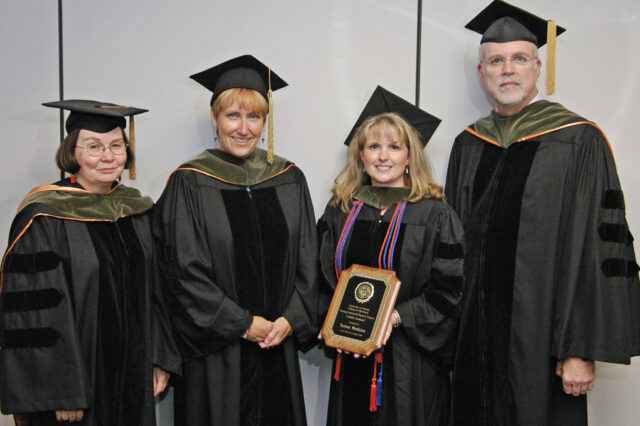UF reaches milestone in building a Gator Nation of pharmacists

Attending the University of Florida College of Pharmacy August commencement are (left to right) WPPD clinical faculty members Nancy Kazarian, Pharm.D., and Linda Rolston, Pharm.D., who also were among the first graduates of the program in 1997; 1000th graduate Teresa Watkins, Pharm.D., (class of 2006); and Sven Normann, Pharm.D., associate dean of distance education. (Photo by Jeff Knee)
As football season quickly approaches, the University of Florida College of Pharmacy is kicking off fall semester with one big score for the Gator Nation: 1,000. That's the number of working pharmacists who have earned advanced degrees through UF distance education to become official Gators.
On Aug. 12, Lt. Cmdr. Teresa Watkins, a pharmacist at the U.S. Public Health Service in Washington, D.C., traveled to Gainesville to claim her academic title and her place as the college's 1,000th graduate of the UF Working Professional Pharm.D. program. Her by-chance ranking was secondary to her personal achievement of graduating with top honors and receiving the college's Outstanding Leadership award.
Her last year of study included weekly clinical assessments at the National Institutes of Health. Balancing the academic demands of the UF program with her work as the designated federal official for the Food and Drug Administration's advisory committees for pulmonary-allergy drugs and reproductive health drugs proved challenging.
"The program was incredibly rigorous. I continue to be amazed by the quality of the faculty as well as the caliber of student the program attracts," Watkins said. "My success is due, in large part, to the support of my family and classmates. I am grateful for the friendships that developed over the last three years."
Although not as well-known as the Army, Navy, Air Force or Marines, the U.S. Public Health Service is an active-duty uniformed service. In recent years, the PHS has responded to the World Trade Center disaster, provided care to postal workers during anthrax scares and deployed units to aid hurricane victims, Watkins said. The flexibility of the WPPD program, which allowed her to continue her military service and build her own clinical experience, was a deciding factor in choosing the UF distance program over other universities, she said.
The PHS is a branch of service quite familiar to William H. Riffee, Ph.D., dean of the College of Pharmacy, who also served there as a young pharmacist. While offering "congratulations from one officer to another," Riffee said he considered the WPPD program to be the crown jewel of the college offerings.
"These students put their education to use the day after mastering the content, raising the level of pharmacy practice immediately in their workplace," Riffee said. "Our WPPD students are among the most highly motivated learners I have ever encountered."
The need for the WPPD program began in the mid-'90s when college and university pharmacy programs nationally began phasing out baccalaureate degrees in pharmacy and began offering the Doctor of Pharmacy Pharm.D. degree as a first professional degree. This left working pharmacists in a difficult situation. Despite many years of work experience, they lacked advanced education and some of the clinical skills of new pharmacy graduates entering the workforce, said Sven Normann, Pharm.D., an associate dean for distance education in the College of Pharmacy.
"For many, taking time away from their careers to re-enroll in a pharmacy program was not an option. From this need to provide advanced education to working professional pharmacists, the UF WPPD distance learning program was born," Normann said.
The online component of the degree is carried out in the student's home via the Internet while a clinical component is done through a network of local pharmacist-facilitators who work in the student's community, and through periodic meetings with and assessments by UF faculty.
In 1996, the WPPD program formed an early partnership with Compass Knowledge Group Inc., a Florida-based higher education services company, Normann said. Compass provided end-to-end services in marketing, student recruitment and retention, and instructional design that allowed UF faculty to concentrate on teaching their students, while growing the national-and international-student enrollment from 40 to 600 by 2005.
As a business service provider acting for the university, Compass launched an aggressive marketing campaign to target prospective students. After increasing national awareness of the UF distance program for working pharmacists, Compass recruited prospective students and helped them through the admissions process, said CEO Dan Devine, a UF engineering alumnus.
"After enrollment, Compass continues to provide a complete range of proactive student services to keep students in the program through graduation," Devine said. "A retention rate of more than 90 percent and steady increases in student enrollment every term are evidence of our successful partnership with UF."
For Watkins, the doctor of pharmacy degree opens new doors. It makes her eligible for a promotion to commander next year, but it also means being better trained as a pharmacist to carry out the PHS mission to provide health care to underserved populations and respond to health-related disasters and events.
"With my new credentials, I'm even thinking about possibly returning to a clinical career in the future - after my military service," Watkins said.